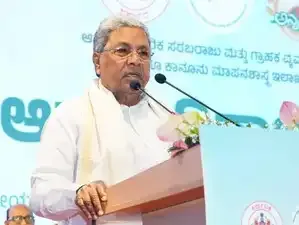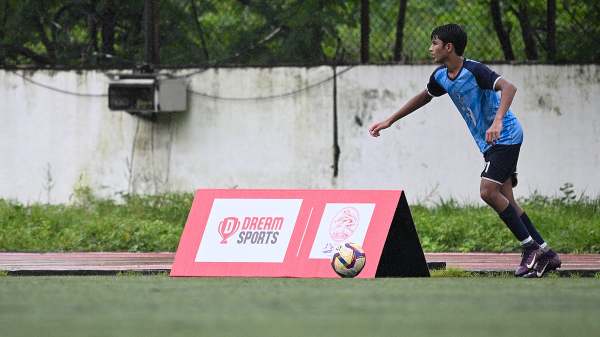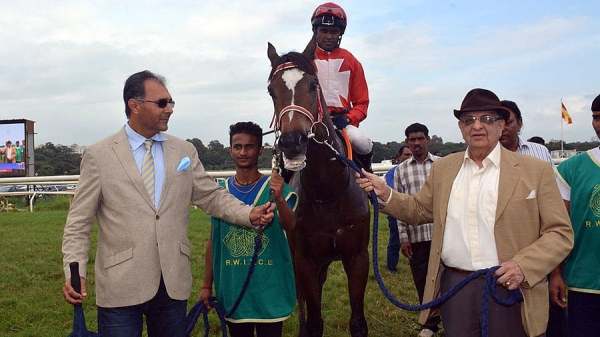Karnataka Chief Minister Siddaramaiah on Wednesday said the increased spending power in people, fuelled by welfare guarantee schemes, has led to higher GST collections for Karnataka.
The GST collection trends signalled broader economic gains for the state, the CM said at the Fiscal Policy Institute in a speech that was read out in his absence.
Contrary to the sceptics, these schemes have neither burdened the exchequer nor fueled inflation. In fact, by increasing consumption at the bottom of the pyramid, they have stimulated local demand, enhanced revenue buoyancy, and reduced rural unemployment, Siddaramaiah said.
Karnataka has, in October, recorded Rs 14,395 crore in GST collections, recording a 10% jump over last year, retaining second place trailing Maharashtra. He accused the Centre of denying about Rs 25,000 crore every year to his state despite the state collecting huge revenues.
A family of four receives an average monthly benefit of around Rs 10,000 while Shakti scheme has led to a 23% increase in women’s workforce participation in Bengaluru. About 80% of women beneficiaries have reported saving up to Rs 1,000 per week on commuting costs.
Gandhi Leadership
Siddaramaiah attributed the success of guarantee schemes to AICC leaders Sonia Gandhi, Rahul Gandhi, Priyanka Gandhi and AICC president Mallikarjuna Kharge. “Their acceptance of our proposals and inclusion of these guarantees in the Congress manifesto was an affirmation of the Congress Party’s ideological commitment to social welfare and human dignity.”
The government, the CM said, has allocated more than Rs 96,000 crore for the implementation of the guarantee schemes. The 2025–26 budget has set aside Rs 51,034 crore. Karnataka now ranks first in the country in per capita income moving from Rs 1,01,858 in 2013–14 to Rs 2,04,605 in 2024–25.
When the government launched guarantee programmes, the political opponents (BJP) mocked, but within months, the same parties began to replicate similar schemes in every poll-bound state without acknowledging their inspiration, Siddaramaiah said.
The GST collection trends signalled broader economic gains for the state, the CM said at the Fiscal Policy Institute in a speech that was read out in his absence.
Contrary to the sceptics, these schemes have neither burdened the exchequer nor fueled inflation. In fact, by increasing consumption at the bottom of the pyramid, they have stimulated local demand, enhanced revenue buoyancy, and reduced rural unemployment, Siddaramaiah said.
Karnataka has, in October, recorded Rs 14,395 crore in GST collections, recording a 10% jump over last year, retaining second place trailing Maharashtra. He accused the Centre of denying about Rs 25,000 crore every year to his state despite the state collecting huge revenues.
A family of four receives an average monthly benefit of around Rs 10,000 while Shakti scheme has led to a 23% increase in women’s workforce participation in Bengaluru. About 80% of women beneficiaries have reported saving up to Rs 1,000 per week on commuting costs.
Gandhi Leadership
Siddaramaiah attributed the success of guarantee schemes to AICC leaders Sonia Gandhi, Rahul Gandhi, Priyanka Gandhi and AICC president Mallikarjuna Kharge. “Their acceptance of our proposals and inclusion of these guarantees in the Congress manifesto was an affirmation of the Congress Party’s ideological commitment to social welfare and human dignity.”
The government, the CM said, has allocated more than Rs 96,000 crore for the implementation of the guarantee schemes. The 2025–26 budget has set aside Rs 51,034 crore. Karnataka now ranks first in the country in per capita income moving from Rs 1,01,858 in 2013–14 to Rs 2,04,605 in 2024–25.
When the government launched guarantee programmes, the political opponents (BJP) mocked, but within months, the same parties began to replicate similar schemes in every poll-bound state without acknowledging their inspiration, Siddaramaiah said.








